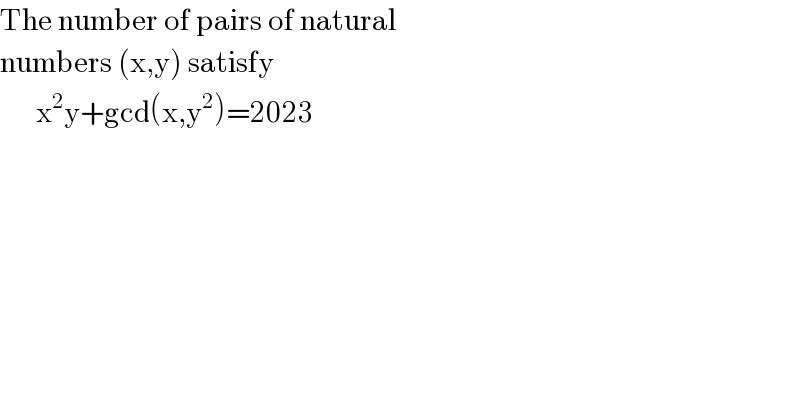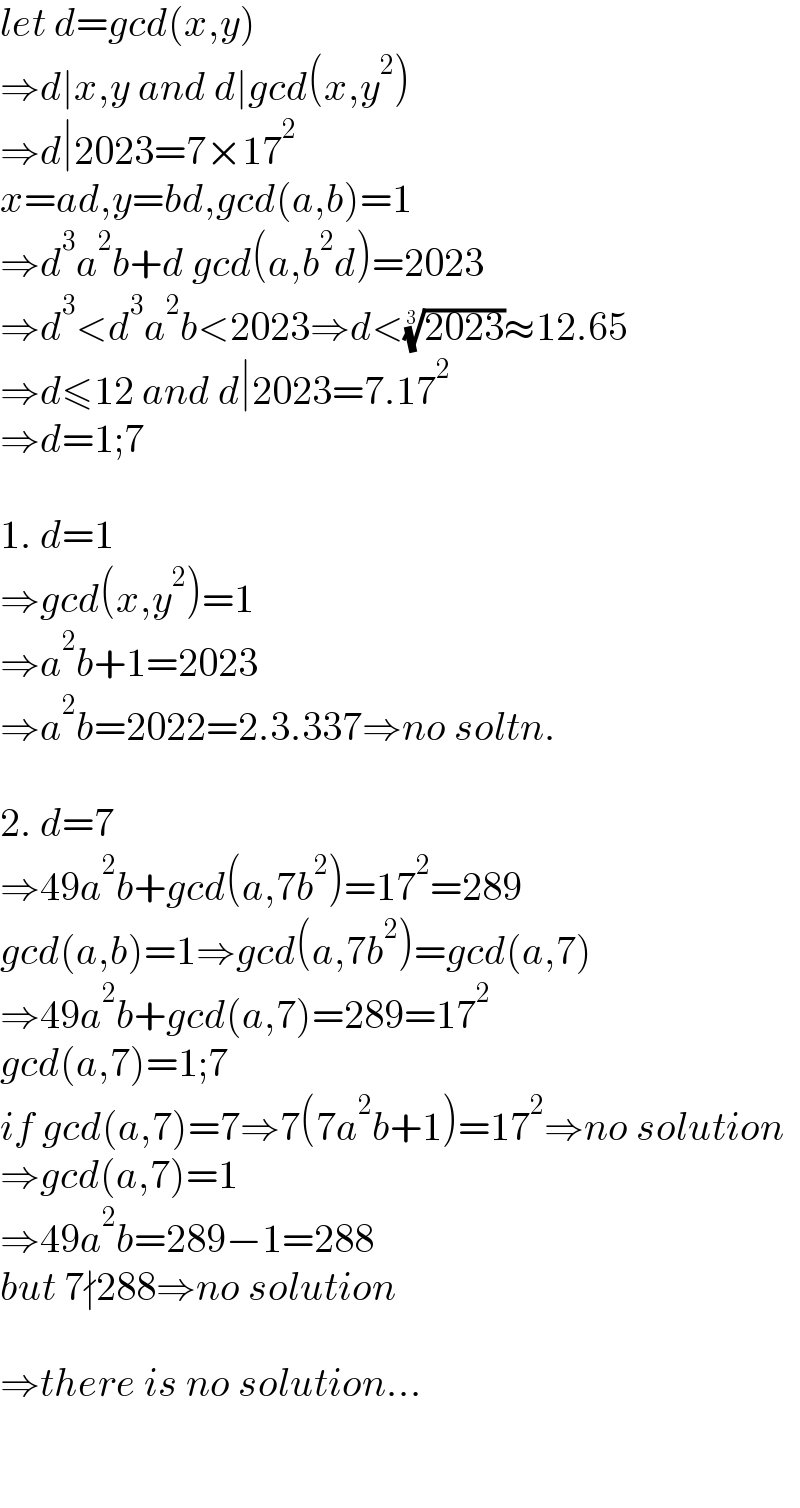
Question Number 189531 by cortano12 last updated on 18/Mar/23

$$\mathrm{The}\:\mathrm{number}\:\mathrm{of}\:\mathrm{pairs}\:\mathrm{of}\:\mathrm{natural} \\ $$$$\mathrm{numbers}\:\left(\mathrm{x},\mathrm{y}\right)\:\mathrm{satisfy} \\ $$$$\:\:\:\:\:\:\mathrm{x}^{\mathrm{2}} \mathrm{y}+\mathrm{gcd}\left(\mathrm{x},\mathrm{y}^{\mathrm{2}} \right)=\mathrm{2023} \\ $$
Answered by aleks041103 last updated on 19/Mar/23

$${let}\:{d}={gcd}\left({x},{y}\right) \\ $$$$\Rightarrow{d}\mid{x},{y}\:{and}\:{d}\mid{gcd}\left({x},{y}^{\mathrm{2}} \right) \\ $$$$\Rightarrow{d}\mid\mathrm{2023}=\mathrm{7}×\mathrm{17}^{\mathrm{2}} \\ $$$${x}={ad},{y}={bd},{gcd}\left({a},{b}\right)=\mathrm{1} \\ $$$$\Rightarrow{d}^{\mathrm{3}} {a}^{\mathrm{2}} {b}+{d}\:{gcd}\left({a},{b}^{\mathrm{2}} {d}\right)=\mathrm{2023} \\ $$$$\Rightarrow{d}^{\mathrm{3}} <{d}^{\mathrm{3}} {a}^{\mathrm{2}} {b}<\mathrm{2023}\Rightarrow{d}<\sqrt[{\mathrm{3}}]{\mathrm{2023}}\approx\mathrm{12}.\mathrm{65} \\ $$$$\Rightarrow{d}\leqslant\mathrm{12}\:{and}\:{d}\mid\mathrm{2023}=\mathrm{7}.\mathrm{17}^{\mathrm{2}} \\ $$$$\Rightarrow{d}=\mathrm{1};\mathrm{7} \\ $$$$ \\ $$$$\mathrm{1}.\:{d}=\mathrm{1} \\ $$$$\Rightarrow{gcd}\left({x},{y}^{\mathrm{2}} \right)=\mathrm{1} \\ $$$$\Rightarrow{a}^{\mathrm{2}} {b}+\mathrm{1}=\mathrm{2023} \\ $$$$\Rightarrow{a}^{\mathrm{2}} {b}=\mathrm{2022}=\mathrm{2}.\mathrm{3}.\mathrm{337}\Rightarrow{no}\:{soltn}. \\ $$$$ \\ $$$$\mathrm{2}.\:{d}=\mathrm{7} \\ $$$$\Rightarrow\mathrm{49}{a}^{\mathrm{2}} {b}+{gcd}\left({a},\mathrm{7}{b}^{\mathrm{2}} \right)=\mathrm{17}^{\mathrm{2}} =\mathrm{289} \\ $$$${gcd}\left({a},{b}\right)=\mathrm{1}\Rightarrow{gcd}\left({a},\mathrm{7}{b}^{\mathrm{2}} \right)={gcd}\left({a},\mathrm{7}\right) \\ $$$$\Rightarrow\mathrm{49}{a}^{\mathrm{2}} {b}+{gcd}\left({a},\mathrm{7}\right)=\mathrm{289}=\mathrm{17}^{\mathrm{2}} \\ $$$${gcd}\left({a},\mathrm{7}\right)=\mathrm{1};\mathrm{7} \\ $$$${if}\:{gcd}\left({a},\mathrm{7}\right)=\mathrm{7}\Rightarrow\mathrm{7}\left(\mathrm{7}{a}^{\mathrm{2}} {b}+\mathrm{1}\right)=\mathrm{17}^{\mathrm{2}} \Rightarrow{no}\:{solution} \\ $$$$\Rightarrow{gcd}\left({a},\mathrm{7}\right)=\mathrm{1} \\ $$$$\Rightarrow\mathrm{49}{a}^{\mathrm{2}} {b}=\mathrm{289}−\mathrm{1}=\mathrm{288} \\ $$$${but}\:\mathrm{7}\nmid\mathrm{288}\Rightarrow{no}\:{solution} \\ $$$$ \\ $$$$\Rightarrow{there}\:{is}\:{no}\:{solution}... \\ $$$$ \\ $$
